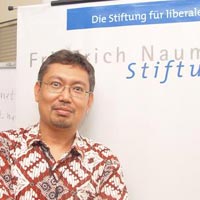Isaiah Berlin's Four Essays on Liberty in Indonesia Language
The Freedom Institute has published Isaiah Berlin’s Four Essays on Liberty. The book, which consists of four discussions of political philosophy, is one of a series of publications in the Freedom Institute’s Book Project. The purpose of this ambitious project is to contribute to the development of liberal thought in Indonesia.
“Freedom” and “liberty” are two words that have found their way into the Indonesian political discourse since the political reforms in 1998. The new political freedoms aspired to in Indonesian society include the freedom to organize, to establish political parties, as well as freedom of expression and the free discussion and dissemination of political ideas through publication mechanisms. In this way a great contribution is being made to the base of knowledge and political debate in Indonesia. Nevertheless the terms “liberty” or “freedom” are not always understood very well, sometimes even being understood negatively. In fact, freedom and liberal are laden with negative connotations in the political history of Indonesia. Liberalism is a Western term that is wrongly perceived as only promoting individualism and ignoring plurality. At a certain political level the term is even considered to be on a par with Communism.
The thinking of the Enlightenment, which was made famous by 18th-century French intellectuals, influenced Isaiah Berlin, a critic of universal and absolute ideas. This does not mean, however, that he is against individual liberty. Berlin was born in Riga, Latvia, June 6th, 1909 as the son of a Jewish timber merchant and spent his childhood in St. Petersburg, Russia. He died in Oxford, England, November 12th, 1997, of a heart attack.
“Freedom” and “liberty” are two words that have found their way into the Indonesian political discourse since the political reforms in 1998. The new political freedoms aspired to in Indonesian society include the freedom to organize, to establish political parties, as well as freedom of expression and the free discussion and dissemination of political ideas through publication mechanisms. In this way a great contribution is being made to the base of knowledge and political debate in Indonesia. Nevertheless the terms “liberty” or “freedom” are not always understood very well, sometimes even being understood negatively. In fact, freedom and liberal are laden with negative connotations in the political history of Indonesia. Liberalism is a Western term that is wrongly perceived as only promoting individualism and ignoring plurality. At a certain political level the term is even considered to be on a par with Communism.
The thinking of the Enlightenment, which was made famous by 18th-century French intellectuals, influenced Isaiah Berlin, a critic of universal and absolute ideas. This does not mean, however, that he is against individual liberty. Berlin was born in Riga, Latvia, June 6th, 1909 as the son of a Jewish timber merchant and spent his childhood in St. Petersburg, Russia. He died in Oxford, England, November 12th, 1997, of a heart attack.
Totalitarianism, which he witnessed in Russia under the Stalin government, alerted Berlin to the thesis that a reality of totalitarian ideas grows from a human desire for liberty, but is founded on a belief in absolute and universal rightness. Berlin reemphasized this idea in his article, “Determination of History,” in which he criticizes the concept of determinism that was put forward by historians and Marxist intellectuals. He labeled such intellectuals “Hedgehogs”, meaning that they were always trying to arrive at a single conclusion: one idea reflects one universal principle where the differences of reality had been convoluted into one coherent system, making heterogeneity in reality not an un-controlled chaos, but having one meaning and suggesting one goal.
Similarly, Berlin labeled other intellectuals “Foxes” – thinkers who did not have a single destination, but believe in a plurality where ideas do not need to be connected, although they should not contradict each other.
The essays of the title of his book, Four Essays on Liberty, refer to four twentieth century political themes. Berlin in fact discusses the four main concepts that he always debated with his critics. The first essay, “Historical Inevitability”, focuses on determinism and its relevance an understanding of man and history. The second, “Two Concepts of Liberty”, is concerned with moral judgment in historical and social thought. The idea discussed focuses on the need to distinguish between positive freedom and negative freedom and its relevance to the distinction between freedom and the conditions for freedom, considering also the freedoms of possession and acquisition. The essay “John Stuart Mill and the Ends of Life” consider monism that explains the unity and harmony of human destination.
In his essays Berlin thought that people are so different that one value system common to all cannot exist. His distinction in the concept of freedom between positive freedom (that to which we are free) and negative freedom (that from which we are free) is well known. Positive freedom is the idea of human freedom, man’s ability to be his own master, and negative freedom is the traditional liberal concept that means the absence of obstacles in a person’s potential choices. He stated that a so-called fundamental freedom that is the ability to make choices is a condition for both freedoms and also a condition for humanity.


No comments:
Post a Comment